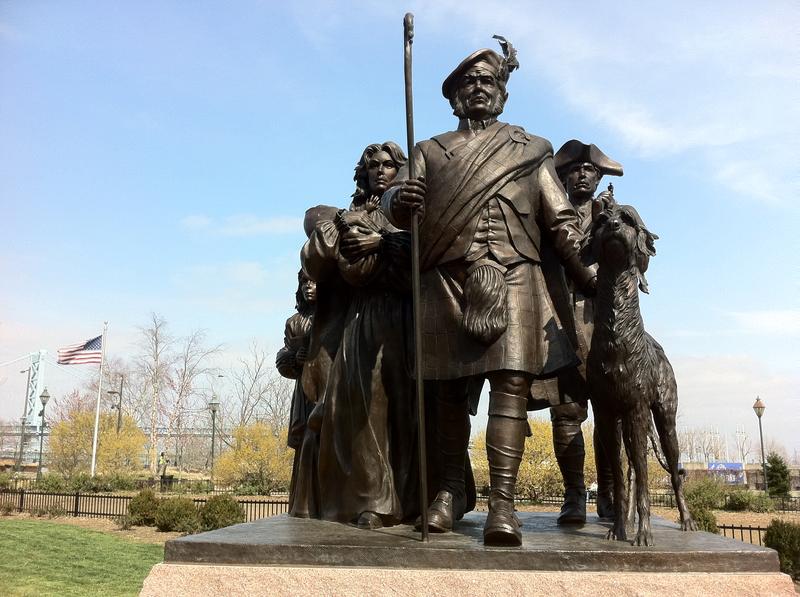 The NYPR Archive Collections
The NYPR Archive Collections
Episode 4 Scotch, Scotch-Irish and Welsh

From the Office of Education study guide:
THE SCOTS, SCOTCH-IRISH, AND WELSH THE SCOTS AND SCOTCH-IRISH The first voice publicly raised in America to dissolve all connection with Great Britain came not from the Puritans of New England, nor the Dutch of New York, nor the Planters of Virginia, but from the Ulster-Scottish (Scotch-Irish) Presbyterians.—GEORGE BANCROFT.
The Scots have been in this country since early colonial times. However, it was not until the eighteenth century that they came in large numbers. Why the Scotch-Irish Came. The great majority of the Scotch- Irish were Scots from the Lowlands (southern part) of Scotland who, about 1610, settled in the North of Ireland. There, they developed the great wool, flax, and linen industries. For a hundred years they prospered. Then the English, by passing a series of laws, all but destroyed the industries which they had built. They were not allowed to hold office unless they gave up their Presbyterian religion. English landlords doubled and tripled their rents. Little wonder that they crossed the Atlantic. their "hearts burning with indignation."
Why the Scots Came.
The Scots, too, came in large numbers after their unsuccessful rebellions against the English king in 1715 and 1745. Many fled overseas to escape punishment. Many others, who were taken prisoners, were shipped to the Colonies as servants. The famine of 1740–41 caused many more to leave Scotland. Most of these settled on our frontiers as our first line of defense against the fierce Indian tribes. The long border warfare of the Scots against the English now became helpful to them along the frontiers of Virginia, the Carolinas, and Tennessee. The Scots and Scotch-Irish—fired by the memory of their old woes— were the first to suggest independence from England. They suggested this in the Mecklenburg Resolutions, a year before the Declaration of Independence was drawn up and signed. Most of them fought in the war and became some of Washington's finest soldiers. Great Scotch- Irish leaders of the day were John Witherspoon, Patrick Henry, and Alexander Hamilton.
What They Gave Us.
During the nineteenth and twentieth centuries, the Scots and Scotch-Irish have continued to come. Their numbers have not been large but they have been large enough to make a deep impression on American life. To music, art, invention, education, industry, religion, and politics, they have brought great gifts. They gave us the little red school house and log colleges. They helped to develop such universities as Northwestern and Princeton. They also gave us the telephone, telegraph, and the reaper.
THE WELSH
It is the duty of all men to seek after truth and to uphold it in the face of all opposition.—Welsh Proverb. From Wales, land of mountains, mines, and music, many people came in the early days seeking religious freedom. Among the one hundred settlers who came to Jamestown in 1607 were at least five Welshmen. One of these was the ancestor of Thomas Jefferson. The Pilgrims were brought to New England by Christopher Jones, the Welsh captain of the Mayflower. Among the Pilgrims were six Welshmen, the best known of whom was John Alden, the cabinet maker.
Famous Welsh Colonists.
The outstanding Welsh immigrant of colonial days was Roger Williams. He was our first great champion of religious tolerance. When Massachusetts, founded on the principle of religious liberty, denied that privilege to others, Roger Williams and his group broke away and founded Rhode Island. There the Quakers and the Jews, not wanted in Massachusetts, found a ready welcome. In 1630, with John Winthrop, came the Welsh ancestor of President Garfield. Among the Welsh who came in 1660, was the father of Elihu Yale—for whom Yale University was named. * - It was during the time of William Penn, whose father was Welsh, that the largest numbers of Welsh came to the colonies. In Philadelphia and the surrounding country, where the Welsh Tract was located, many Welsh place names may still be found.
During the Revolutionary War, those of Welsh descent who distinguished themselves included Ethan Allen, "Mad" Anthony Wayne, Thomas Jefferson, and Robert Morris. - What the Welsh Did. With the discovery of coal in Pennsylvania by a Welshman, more and more Welsh people came. Long famous as miners and iron workers, they took an active part in developing the coal and iron industry of Pennsylvania, Ohio, West Virginia, Alabama, Kansas, Oklahoma, and Colorado. It was a Welshman, John Griffith, who gave us the greatest of the clipper ships. Wherever the Welsh go may be found choral groups and singing festivals. Just as the Irish honor the memory of St. Patrick on March 17, so the Welsh honor the memory of St. David on March 1. Most famous of Welsh traditions is the Eisteddfod—a festival of song and oratory.
WNYC archives id: 125536